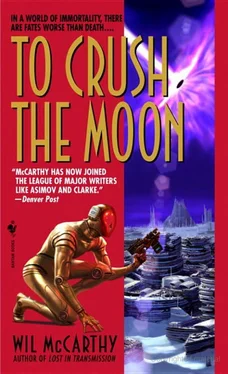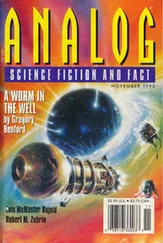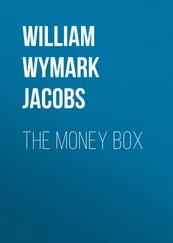In any case, between the extremes of hydrogen nuclei and neutron stars lay the man-made neuble: a two-centimeter atom held together by pure human stubbornness. They had only two uses: they could be squeezed into the tiny black holes from which collapsium was made, or they could be exploited architecturally for their intrinsic gravity, which was considerable.
In free space, the pull of an ordinary spherical neuble could break a person’s back, could fold a person’s limbs around itself in a bone-snapping, rib-crushing embrace that admitted no hope of escape, or even breath. He’d heard of accidents like that, where it took a team of specialists and superstrong robots a week and a half to pry the body off. Not for any sentimental reason, but because burning it off could ignite or destabilize the diamond shell, releasing the tremendous pressure it enclosed. Bang.
For this reason, neubles were rarely encountered in free space, and the builders who employed them were very careful about surrounding them with protective structure. Their gravity fell away rapidly; two and a half meters away it was Earthlike, and at twenty-five you could barely feel it. Squashing one flat like this was a neat trick that spread the mass and gravity around, allowing you to get closer without getting killed. But it also struck Conrad as surprisingly risky for the staid old Queendom of Sol; he’d only ever heard of circular platforms being fashioned in this way. Squares and triangles had a nasty habit of concentrating stress at the corners.
“How old is this platform?” he asked the wall.
And one of the hollie windows replied, “A very intelligent question, sir. It has been in service as a tourist destination since Q20.”
The very earliest days of the Queendom, in other words. “Huh. And who designed it?”
“Declarant-Philander Marlon Sykes, sir.”
Ah. A man so comfortable with risk that he’d very nearly destroyed the sun, very nearly murdered the king and queen. He had murdered thousands of others, if incidentally, and he was a torturer, too—a closet sadist exposed only at the very end of his days. The Queendom had never imposed a death penalty, but in Sykes’ case it had made something close to an exception, firing him off into the void at the speed of light, in a cage of collapsium that sealed him off forever from the universe of decent people.
A difficult man to admire, yes, but Conrad had studied architecture, and that was a subject one simply could not discuss without frequent invocation of that accursed name. Sykes had invented superreflectors and a hundred other common things, and was responsible for some of the most striking and innovative structures in human history. Including, arguably, the Nescog, which had been built amid the ruins of King Bruno’s original collapsiter network. Bruno had designed the Nescog as well, but he’d had Sykes’ own Ring Collapsiter, ill-fated but undeniably ingenious, to draw upon for inspiration.
“Hasn’t anyone complained?” Conrad asked. “Aren’t people afraid to come here? Why not just build a new platform?”
“Excellent questions,” the hollie window congratulated him. “I don’t have the information here, and the speed of light is such that I may not locate it for several hours. But I will research these issues and forward the results to you.”
“Um, okay. Do you need my name?”
“I have your name, sir,” the window informed him proudly. “It’s an indelible part of your fax trace, and also encoded in your genome.”
Ah. Of course. Conrad had grown up with all this, and it was slowly coming back to him. There was something vaguely unsavory about it—he’d never been crazy about machines that watched his every move, talked secretly among themselves, and also enforced such laws as they were able to. In what way did that advance the causes of freedom and human dignity? But at the same time, he felt a part of him melting with relief. On Sorrow there was no backup, no supervision, no help . If you got into trouble, you got yourself out or you died. Conrad and his friends got out; Bascal and his friends had apparently died. But no more. Here, that kind of death simply wasn’t possible.
But Conrad’s parents were Irish, and in spite of his best efforts they had managed to imprint him with a certain degree of superstition. He had seen a ghost once, no shit, and he looked around now, suddenly realizing all the other tourists had filed away without his noticing. He was here alone with the machines, on a platform designed by the very cleverest of history’s monsters.
“I think I’ll go to Denver,” he said to the fax machine, and hurried to fling himself through the plate.
But Denver, where arguably his own involvement in the Children’s Revolt had begun, was all wrong. Most of it hadn’t changed at all; the old skyline was still there, instantly recognizable. The streets were still bursting with children—for this was a Children’s City—and with buskers and athletes and pedestrians , for this was also an Urban Preservation District where short-range faxing was severely discouraged.
But though the old Denver was still visible beneath, today the city had a lot of extra grown-ups pushing their way through the streets of downtown, and a lot of robots scurrying daintily through morning errands. And the downtown district itself lay in the deep morning shadow of six enormous towers—not orbital towers, but simple pressurized stratscrapers capable of holding a million people each. Taller than the mountains to the west, taller even than the Green Mountain Spire which had once been the city’s signature landmark, they… they ruined it. They made the city look small and artificial and old.
“How long have those been there?” he asked a passerby, pointing up at the monstrosities.
“Huh?” said the man, looking for something out of the ordinary and not finding it. His breath steamed in the October air.
“The towers,” Conrad said, huddling into the warmth of his wellcloth jacket again, for he had not been cold in many decades. “The big ones. How long?”
“Oh, a long time. Hunnerds of years,” the man said. Then, looking Conrad over, he brightened. “Hey! You’re that feller from Barnard, aren’t you? Returned from the stars to back here whence you were born.”
“I am,” Conrad admitted, “though I haven’t been to ‘whence’ yet. I’m from Ireland.”
“Eh? Well, welcome back to society, just the same. Does it feel good? Does it feel right?”
“I don’t know,” Conrad answered. “I only lived here for twenty-five years. I’ve been gone for a thousand.”
And yet, those twenty-five loomed very large in his memory. At the time, they’d been one hundred percent of his life’s experience, whereas Barnard, even at the end, had never been more than ninety percent. And hell, thinking back now it didn’t feel like much more than half. A lot of important things had happened to him out there—shaping his character, informing his judgment—but the trajectory of his life had been determined here. Literally: right here on this very street, on a warm July night, with the Prince of Sol at one elbow and Ho Ng—a man Conrad would one day murder—at the other. Denver was the crucible to a lifetime of rebellion; the cannon from which he’d been fired.
“It looks smaller,” he said. “It feels crowded and weedy and gone-to-seed. But that’s a funny thing, because nothing has really changed. Aye, and maybe that’s the problem.”
“Well, good luck to yer,” the man offered, grabbing and pumping Conrad’s hand, then dropping it and moving on.
Ireland should be the next stop: a ritual visit to his parents, whom he loved and missed. They had raised him well enough; his vagabond life could hardly be blamed on anyone but himself. But this was a funny thing, too, because where Denver still felt recent to him, his life with Donald and Maybel Mursk seemed impossibly remote. And those had been the same time .
Читать дальше












